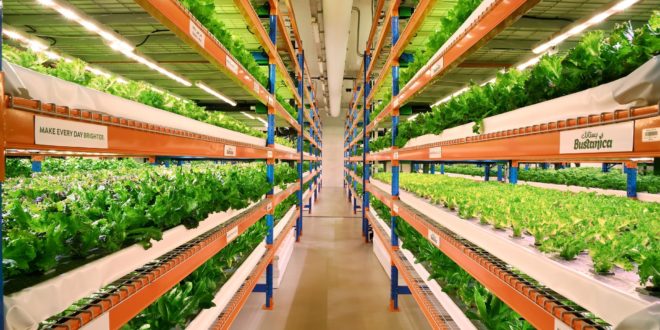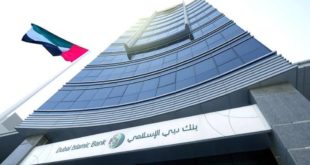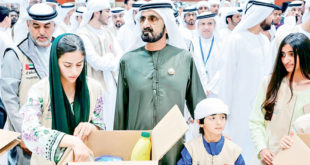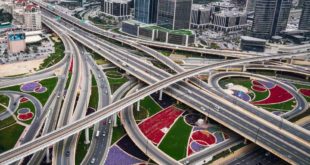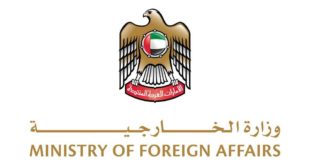The UAE adopts sustainable agricultural patterns based on modern technologies and attaches great importance to scientific studies and research.
• Launching strategic initiatives to facilitate the use of agricultural technology and the development of climate-smart food and agricultural systems.
• Introducing hydroponics within the country’s agricultural system to increase the productivity of environmentally friendly crops that adapt to the climate and reduce emissions.
• “Climate Agricultural Innovation” is a global initiative led by the UAE and the US to mobilize support and investments for climate-smart agriculture.
• The country is witnessing a growing trend towards developing vertical farms as a promising solution that contributes to achieving food security.
ABU DHABI, June 22: The UAE has made great strides in developing climate-smart agricultural practices, as part of its endeavor to achieve its strategic goal of achieving climate neutrality by 2050 and the objectives of the National Strategy for Food Security by 2051, and reducing carbon emissions in the agricultural sector.
Climate-smart agriculture is defined as climate-resilient agriculture. It is an integrated approach to managing agricultural lands and preparing agricultural systems to respond effectively to climate changes, ensuring the achievement of the three objectives of increasing productivity and economic return from agriculture in a sustainable manner, adapting to climate change, and reducing greenhouse gas emissions.
The UAE has made significant achievements in this context by adopting innovative agricultural technology projects such as (the net house with solar energy), and harnessed research efforts and financial resources for that, which makes its experience in this sector an inspiring global model, especially as it hosts the Conference of the Parties to the Convention United Nations Framework Convention on Climate Change “COP 28” during the period from November 30 to December 12 of this year in “Expo City Dubai”, which makes this global platform an ideal opportunity to present inspiring experiences and make a quantum leap in climate-smart agriculture to achieve security sustainable food.
The “Impact” axis of the “National Sustainability” campaign, which was recently launched in conjunction with the preparations for the “COP 28” conference, reviews the positive impact of sustainability initiatives in the UAE in various fields, as the campaign aims to raise awareness about environmental sustainability issues and encourage community participation.
Innovative solutions.
The agricultural sector in the UAE has developed significantly since 1971, and the country has made great efforts over the past years to build an agricultural sector that is more capable of contributing to the food security system, by adopting sustainable and climate-smart agricultural patterns based in their entirety on innovative technologies and solutions such as protected agriculture and agriculture without Tarabah (hydroponic farming), organic farming, vertical farming, net house farming, and providing sustainable solutions by reusing recycled water in the agricultural sector, in addition to paying attention to scientific studies and research in the agricultural field, in order to overcome the challenges facing this sector, such as Scarcity of water resources, unsuitable land, soil salinity, and difficult environmental conditions (high temperatures, drought).
The UAE continued to pay attention to the agricultural sector through the use of modern technological methods that allow a significant increase in agricultural production with low rates of consumption of water and natural resources, and launched several initiatives in this context. Including the opening of the Agricultural Innovation Center in 2014 with the aim of keeping abreast of developments in the agricultural sector and its sustainability in the country by creating modern agricultural technologies, conducting research and providing consultations in the agricultural field.
Sustainable food production.
In 2018, the UAE launched the National Strategy for Food Security 2051, with the aim of developing a comprehensive national system based on the foundations of enabling sustainable food production, by employing modern techniques and technology, enhancing local production, developing international partnerships to diversify food sources, and activating legislation and policies that contribute to improving food production. Nutrition and waste reduction, to ensure food security in all circumstances, which enhances the UAE’s position in global food security indicators, and transforms it into a center for innovation-based food security.
The program to accelerate the adoption of modern agricultural technology is one of the most important initiatives in the UAE to achieve food security. The program launched 10 strategic initiatives to facilitate the adoption of agricultural technology in the country, find effective solutions to raise the efficiency and increase the competitiveness of national food production, and provide support channels for stakeholders in this sector. Attracting the necessary investments to establish sustainable agricultural projects.
In 2019, the UAE launched the “Food Technology Challenge”, the largest of its kind globally, with the aim of exploring the technology of the next decade of innovations and technologies that will change traditional agricultural practices efficiently and sustainably, as well as developing innovative solutions for food production and management in the Emirates, and employing advanced technology in finding tools And efficient and effective technologies to overcome the challenges of the agricultural sector, in order to achieve the sustainability of food production in the UAE, to be a leading global center for food security.
With the aim of supporting the adoption of local production of modern technology; In 2020, the Council of Ministers approved the formation of a working group to develop the modern agricultural sector in the country. The team is responsible for developing capabilities to improve the ability to provide food products to meet market needs, and to contribute to raising the ability to face global changes in the food sector, in addition to focusing on creating commercial opportunities. and raise the competitiveness of the local product.
In 2020, the Council of Ministers approved the National System for Sustainable Agriculture, which aims to raise the percentage of self-sufficiency in the country from agricultural crops, and improve economic returns.
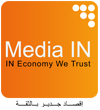 Media ININ Economy We Trust
Media ININ Economy We Trust

